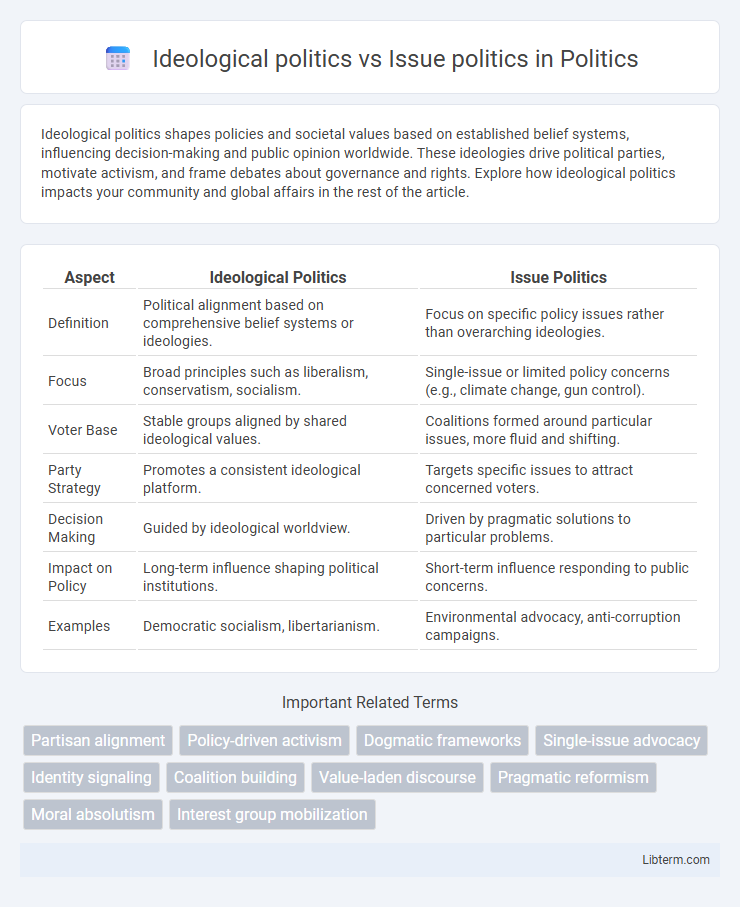Ideological politics shapes policies and societal values based on established belief systems, influencing decision-making and public opinion worldwide. These ideologies drive political parties, motivate activism, and frame debates about governance and rights. Explore how ideological politics impacts your community and global affairs in the rest of the article.
Table of Comparison
| Aspect | Ideological Politics | Issue Politics |
|---|---|---|
| Definition | Political alignment based on comprehensive belief systems or ideologies. | Focus on specific policy issues rather than overarching ideologies. |
| Focus | Broad principles such as liberalism, conservatism, socialism. | Single-issue or limited policy concerns (e.g., climate change, gun control). |
| Voter Base | Stable groups aligned by shared ideological values. | Coalitions formed around particular issues, more fluid and shifting. |
| Party Strategy | Promotes a consistent ideological platform. | Targets specific issues to attract concerned voters. |
| Decision Making | Guided by ideological worldview. | Driven by pragmatic solutions to particular problems. |
| Impact on Policy | Long-term influence shaping political institutions. | Short-term influence responding to public concerns. |
| Examples | Democratic socialism, libertarianism. | Environmental advocacy, anti-corruption campaigns. |
Understanding Ideological Politics
Understanding ideological politics involves analyzing how fixed belief systems shape political behavior and policy preferences, emphasizing core values and identity over specific issues. Ideological politics often drive partisan loyalty and influence voting patterns by framing political debates within broad worldviews such as conservatism, liberalism, or socialism. This approach contrasts with issue politics, where positions fluctuate based on pragmatic responses to current events or policy challenges.
Defining Issue-Based Politics
Issue-based politics focuses on specific policy concerns such as healthcare, climate change, or economic reform, emphasizing pragmatic solutions over broad ideological frameworks. It prioritizes tangible outcomes and voter interests directly linked to these problems, enabling flexible alliances across traditional political divides. This approach often fosters a more inclusive and responsive political dialogue centered on addressing urgent societal needs.
Historical Context of Ideological and Issue Politics
Ideological politics emerged prominently during the 19th century with the rise of liberalism, conservatism, and socialism, rooted in comprehensive worldviews and structured party systems. Issue politics gained significant traction in the late 20th century as voters increasingly focused on specific policy concerns like civil rights, environmental protection, and economic reform, reflecting greater political pluralism and voter fragmentation. The historical transition from ideology-driven mass parties to issue-oriented movements illustrates changes in political engagement and the diversification of political discourse in modern democracies.
Key Differences Between Ideological and Issue Politics
Ideological politics centers on broad belief systems and core values that guide political behavior and policy preferences, whereas issue politics focuses on specific public concerns or policy matters that may cut across ideological lines. Key differences include the scope of influence, with ideology shaping long-term political identity and voting patterns, while issue politics drives short-term mobilization around particular causes or legislative proposals. Ideological politics often fosters party loyalty and consistent platforms, whereas issue politics can lead to coalition-building among diverse groups united by a single concern.
Motivations Behind Voter Behavior
Voter behavior in ideological politics is driven by deep-rooted beliefs, values, and identity aligning with a party's core principles, leading to consistent support regardless of specific policy changes. In contrast, issue politics motivates voters through immediate concerns or single issues, such as economic policy, healthcare, or climate change, causing more fluid and situational voting patterns. Understanding these motivations helps predict electoral outcomes and tailor political campaigns to resonate with either long-term ideological commitments or short-term issue preferences.
Advantages of Ideological Politics
Ideological politics offers clear frameworks that help voters align their values with policy choices, fostering strong party loyalty and predictable political behavior. This approach simplifies complex political landscapes by providing consistent principles that guide decision-making across diverse issues. It also encourages long-term strategic planning and coherent policy development, enhancing the stability of political institutions.
Strengths of Issue-Based Politics
Issue-based politics offers practical solutions to specific societal problems, fostering clear policy debates that resonate with voters' immediate concerns. It enhances democratic engagement by prioritizing evidence-driven decisions and encourages bipartisan cooperation centered on shared goals rather than rigid ideological divides. This pragmatic approach often results in more effective governance and increased public trust in political institutions.
Challenges and Criticisms of Both Approaches
Ideological politics often faces challenges related to polarization and inflexibility, as rigid adherence to a set of beliefs can hinder compromise and pragmatic decision-making. Issue politics encounters criticism for its potential to fragment political discourse, leading to short-termism and neglect of broader systemic goals. Both approaches struggle with balancing depth of conviction and inclusiveness, impacting their effectiveness in addressing complex societal problems.
Impact on Political Parties and Campaign Strategies
Ideological politics emphasizes core beliefs and values, shaping political parties around consistent, long-term platforms that solidify loyal voter bases and guide campaign messaging. Issue politics centers on specific, often changing public concerns, prompting parties to adapt strategies rapidly to address current voter priorities and exploit emerging opportunities. This dynamic influences political parties to balance ideological coherence with responsiveness to public opinion, impacting candidate positioning and resource allocation during campaigns.
Trends and Future Outlook of Political Engagement
The rise of issue politics, driven by social media and increased access to information, highlights a shift away from traditional ideological allegiance toward focused advocacy on specific societal challenges like climate change and racial justice. This trend fosters more dynamic and participatory political engagement, particularly among younger demographics who prioritize practical solutions over partisan loyalty. Future political landscapes are expected to emphasize fluid coalitions and issue-based mobilization, potentially reshaping electoral strategies and governance models worldwide.
Ideological politics Infographic

 libterm.com
libterm.com